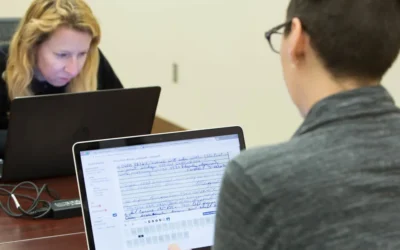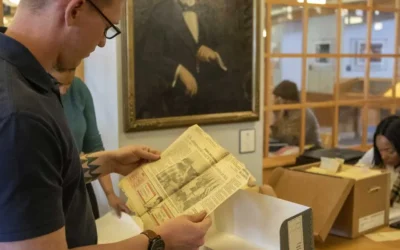Archivists as Champions of Social Responsibility
Margot Note
At the core of an archivist’s social responsibility is recognizing that the archival record is a cornerstone of cultural heritage.
The archival record is not an exclusive domain; it is a shared cultural heritage, and archivists embrace their social responsibilities by establishing equitable, clearly defined policies and procedures for selecting, preserving, accessing, and using this invaluable resource.
The archival record is a tangible connection to the past, a repository of stories, knowledge, and experiences that define our societies, institutions, and individuals. Archivists understand that they are the stewards of this heritage, entrusted with preserving it for current and future generations.
Individuals and communities depend on archivists to ensure their memories are not lost. Archivists engage with diverse constituencies, each with its unique history and cultural identity. They work with community organizations, institutions, and individuals to collect, organize, and protect the materials that represent their collective memory.
Community Archives
Community archives play a vital role in preserving the memory of marginalized and underrepresented groups. These archives reflect the diversity of human experiences, offering a space for the voices and stories of those whose histories that dominant narratives have overshadowed. Archivists collaborate with these communities, acknowledging the importance of inclusivity and equitable representation.
Beyond custodians of historical documents, archivists are also interpreters and facilitators of access. They understand that the archival record is a living resource that has the power to transform society. It is through the careful curation and accessibility of materials that archivists contribute to increased social awareness and understanding of past events.
The archival record contains the raw materials of history, allowing individuals to explore and analyze the past from multiple perspectives. It provides insights into the complexities of social, political, and cultural changes, shedding light on the motivations and consequences of historical events.
Accessible Records
Archivists work to make the archival record accessible to users. They develop policies and procedures that ensure equitable access, removing barriers to entry and promoting inclusivity. Archivists seek to support researchers, students, educators, and the broader public, understanding that these diverse user communities have varying needs and expectations.
One of the key components of an archivist’s social responsibility is the establishment of policies and procedures. These guidelines serve as a framework for selecting, preserving, accessing, and using archival materials. They ensure that the archival record is treated with the respect and care it deserves while upholding the principles of transparency, equity, and inclusivity.
The Role of Policies
Selection policies guide archivists in making decisions about what materials to preserve. These policies consider the historical, cultural, and social significance of materials, aligning the collection’s scope with the mission and goals of the archival organization. Selection is a critical aspect of social responsibility, as it reflects the commitment to representing a wide range of voices and experiences.
Preservation policies and procedures safeguard materials for future generations. Archivists employ techniques to mitigate deterioration, from climate control to proper storage methods. These practices are essential for upholding the social responsibility of archivists, as they guarantee the long-term accessibility and availability of the archival record.
Access and use policies provide equitable opportunities for individuals and communities to engage with the archival record. Archivists work to strike a balance between openness and ethical considerations, respecting issues of privacy, confidentiality, and sensitivity. Access policies are founded on principles of inclusivity, ensuring that the record is accessible to all, regardless of background or affiliation.
Connected to History
Archivists are the champions of social responsibility, dedicated to preserving the memory of individuals and communities for the greater public good. They embrace their role as stewards of cultural heritage, working tirelessly to provide equitable policies and procedures for selecting, preserving, accessing, and using the archival record. By doing so, they contribute to the increased social awareness and understanding of past events, fostering a society connected to its history and committed to inclusivity and respect for diverse voices.
Margot Note
Margot Note, archivist, consultant, and Lucidea Press author is a regular blogger, and popular webinar presenter for Lucidea—provider of ArchivEra, archival collections management software for today’s challenges and tomorrow’s opportunities. Read more of Margot’s posts here.
Never miss another post. Subscribe today!
Similar Posts
Collaborative Archival Relationships
Collaborative projects are instrumental in showcasing how archival collections can benefit various organizational departments.
Informational, Evidential, and Intrinsic Values within Archives
Archives provide authentic, reliable information and hold values that reflect their functions and uses; informational, evidential, and intrinsic.
A Sustainable Archives
Archivists prioritize sustainable practices and policies, rooting their work in ethics of care, often preferring digital processing and preservation
Archival Branding and PR Strategies
Archivists who adopt branding and PR strategies both safeguard historical treasures and contribute to their organizations’ evolution.




Leave a Comment
Comments are reviewed and must adhere to our comments policy.
0 Comments